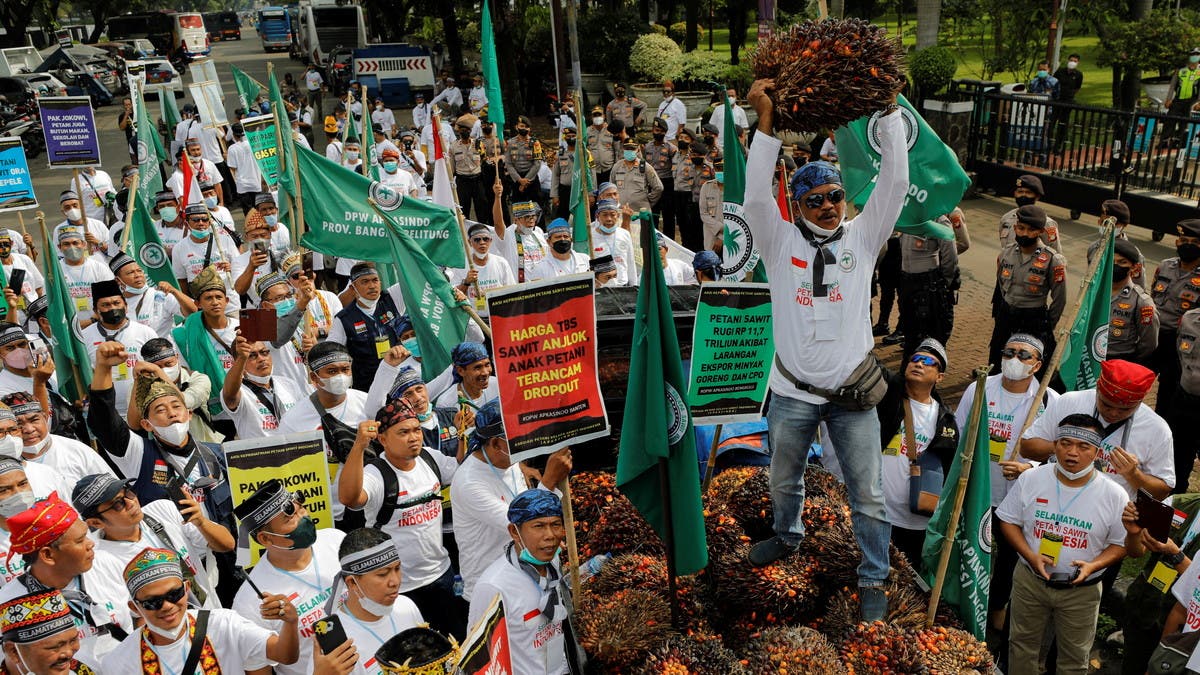Hundreds of Indonesian smallholder farmers on Tuesday staged a protest in the capital Jakarta and in other parts of the world’s fourth most populous country, demanding the government end a palm oil export ban that has slashed their income.
Indonesia, the world’s top palm oil exporter, on April 28 halted shipments of crude palm oil and some of its derivative products to control soaring prices of domestic cooking oil, rattling global vegetable oil markets.
For the latest headlines, follow our Google News channel online or via the app.
However, government efforts to make cooking oil, a household staple for many Indonesian dishes, more affordable have failed, undermining the approval rating of President Joko Widodo and prompting the farmers’ backlash.
“Malaysian farmers are wearing full smiles, Indonesian farmers suffer,” one of the signs held up by protesters read. Malaysia is the second-largest producer of palm oil and aims to fill the market gap opened by Indonesia’s export ban.
Marching next to a truck filled with palm oil fruit, farmers held a rally outside the offices of the Coordinating Ministry of Economic Affairs, which is leading the government policy.
In a statement, the smallholder farmers’ group APKASINDO said since the export ban the price of palm fruit had dropped 70 percent below a floor price set by regional authorities.
Independent farmers are not protected by the floor price, which is fixed through an agreement between mills and large-scale cooperatives.
APKASINDO estimates at least 25 percent of palm oil mills have stopped buying palm fruit from independent farmers since the ban started.
This indicates that storage tanks are filling up at mills, said Albertus Wawan, a farmer from West Kalimantan province, by telephone.
Similar protests by farmers were also planned in 22 other provinces, APKASINDO said.
Yuslan Thamrin, a farmer attending the Jakarta rally, said celebrations in his area of Aceh province in Sumatra for the end of Ramadan this month were more muted because of the lost income from the export ban.
“With such poor prices, farmers are hesitating to even harvest,” he said, adding that mills were also not taking in more fruit because storage at ports was full.
Jokowi’s approval drops
Another farmer pointed to the dilemma palm oil smallholders face.
“Harvesting the fruit is not profitable, but leaving it rotting would damage the trees,” Bambang Gianto, a farmer in South Sumatra, said by telephone.
Representatives of the farmers had met some government officials to convey their demands, economic ministry official Susiwijono Moegiarso said.
President Widodo imposed the export ban on palm oil after earlier policies failed to control domestic cooking oil prices.
Jokowi, as the president is popularly known, said the need for affordable food trumped revenue concerns and the ban would be lifted only after domestic needs were met.
But an opinion poll this week showed his approval rating sagged to 58.1 percent in May, the lowest since December 2015, largely tied to the rising cost of cooking oil.
Yose Rizal Damuri, an executive director at the Center for Strategic and International Studies, said the type of price control policies Indonesia was trying to implement were flawed.
“This is a policy that was taken just to show that the president is doing something,” he said, urging authorities to allow the price to track the market and compensate consumers through other means.
Chief Economics Minister Airlangga Hartarto has said the ban would stay in place until bulk cooking oil prices drop to 14,000 rupiah ($0.9563) per liter across Indonesia.
Trade Ministry data showed as of Friday that bulk cooking oil averaged 17,300 rupiah per liter, down from an average of 18,000 rupiah in March but up from 13,300 in July.
Read more:
Indonesia seizes tanker over palm oil export ban violation
Malaysia aims to regain palm oil market share in EU amid global shortage
Indonesia widens export ban to include CPO, refined palm oil

 World3 years ago
World3 years ago
 World3 years ago
World3 years ago
 Business12 months ago
Business12 months ago
 Entertainment7 years ago
Entertainment7 years ago
 World7 years ago
World7 years ago
 Entertainment7 years ago
Entertainment7 years ago






